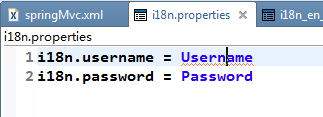- react-intl——react国际化使用方案
苹果酱0567
面试题汇总与解析java开发语言中间件springboot后端
国际化介绍i18n:internationalization国家化简称,首字母+首尾字母间隔的字母个数+尾字母,类似的还有k8s(Kubernetes)React-intl是React中最受欢迎的库。使用步骤安装#usenpmnpminstallreact-intl-D#useyarn项目入口文件配置//index.tsximportReactfrom"react";importReactDOMf
- 前端使用react-intl-universal进行国际化
Stephy_Yy
#调研reactjsjavascriptcss
一、国际化/i18n目前国际化,就是开发者写对象,一个key关联若干语种的翻译。相比于浏览器自带的翻译功能,语义更加准确。“国际化”的简称:i18n(其来源是英文单词internationalization的首末字符i和n,18为中间的字符数)二、react项目国际化react-intl是业界最受欢迎的软件包之一:React-intl是雅虎的语言国际化开源项目FormatJS的一部分,通过其提供的
- 2022-12-04
云鹭
一个人越活越好的5个习惯坚持学习生活就像河水,是不断流动的。站在岸边的人,只能停在原地,看水流过。乘舟而行的人,方能与时间同行。这只舟便是“坚持学习”。如果坚持读书,或许在与人聊天时,能让你因出色的谈吐而被欣赏;如果坚持学习一门新技术,或许在新业务拓展时,机会就正好属于你;如果坚持学一门外语,或许在需要国际化人才时,你就会是不二人选。坚持学习,你一定会在未来遇见盛开的自己。学会思考学会思考,有时比
- 【C++开发中XML 文件的妙用】
勾魂凉皮
c++xml开发语言
在C++中,XML(可扩展标记语言)文件通常用于存储配置数据、应用程序设置、数据交换格式等。由于其结构化和可读性强的特点,XML文件在配置管理、序列化、跨平台数据交换以及软件国际化等方面有着广泛的应用。XML文件的妙用配置管理:XML文件经常被用来存储应用程序的配置。可以动态读取XML文件来配置应用程序的行为,而无需重新编译代码。数据交换格式:XML是跨平台、跨语言的数据交换格式。许多网络协议和数
- vue3项目中使用 vue-i18n国际化插件,实现多语言效果
回忆哆啦没有A梦
第三方库使用的问题vue相关问题(vue3vue2)第三方应用jsdk使用问题vue.js前端javascript
**i18来源:**国际化的英文单词internationalization太长了,掐头去尾取首字母i和尾字母n,中间刚好还有18个字母,就缩写为了i18n。安装直接下载/CDNnpm/yarn安装npminstallvue-i18n//oryarnaddvue-i18n基本使用创建语言包在项目中创建一个locales目录,用于存放不同语言版本的翻译文件。例如,可以在locales目录下创建en.
- vue-i18n 国际化
A o尐懶猫o
vue.js前端javascript
插件基本思路定义语言包:需要几种语言展示,就定义几个语言包。组合语言包对象:创建对象,对语言包进行组合,对象的key为语言包引用,值为语言包对象。创建实例:创建vue-i18n类的对象,添加message和locale属性。挂载:挂载创建的实例对象。安装插件vue-i18n使用
[email protected]使用
[email protected]定义和组合
- **项目推荐:探索全球化的Web应用 —— Apache Sling I18N**
解然嫚Keegan
项目推荐:探索全球化的Web应用——ApacheSlingI18Nsling-org-apache-sling-i18nApacheSlingI18NSupport项目地址:https://gitcode.com/gh_mirrors/sl/sling-org-apache-sling-i18n在全球化日益加深的今天,软件和网络服务的国际化与本地化(I18N)变得至关重要。ApacheSling,
- SpringMVC架构介绍
丹_妮
spring
MVC框架要做的事情?1)将url映射到java类或java类的方法2)封装用户提交的数据3)处理请求-调用相关的业务处理-封装响应数据4)将响应的数据进行渲染jsphtml为什么要学习SpringMVC?性能较struts2好简单、便捷、易学天生和Spring无缝集成,使用Spring的IOC和AOP还有事务使用约定由于配置能够进行简单的junit测试支持restful风格异常处理本地化、国际化
- 读书笔记:职业教育国际交流与合作
Dragonhsu
读石伟平教授文章有感学习国际经验主要从下面几个方面着手:1.引进教育模式从20世纪80年代开始,引进德国双元制、MES,90年代引进加拿大CBE,21世纪澳大利亚的TAFE和英国的BTEC,德国行动导向职业教育课程模式。现在这些内容还没有吃透,本土化还有很多工作可做。2.合作办学:进行如火如荼3.师资共建:依然是热点4.职业资格合作:随着国际化进程的加快,将是未来主要的发展之一。5.引进资金:以前
- 2023-09-28
花阡陌2022
允许一切发生,是我留在这个城市的理由来魔都20多年,回首这么多年,我受过很多委屈,吃过很多苦,收到过别人的鲜花和掌声,但对我来说,我觉得人生是一个游戏场所,我们在这个繁华的国际化大都市,只管前行,不问来路,不断成长。这就是我一直鼓励自己留在这座城市的理由。人有时候会有一种松弛感。01松弛感是为自己的人生做决定和其他沪漂不同,我来上海市因为我考公务员差0.5分,我决定离开那个伤心之地,因为在哪个偏远
- 冬妈的幸福生活之——体验香港风情
项晓丹珠宝鉴定师
2015.3.6冬妈的幸福生活之——体验香港风情在香港这个国际化大都市的地方,会有与众不同的体验喔!2015年香港珠宝展上的冬妈先说这次香港珠宝展吧!香港珠宝展作为亚洲最具有影响力的珠宝展,参展的商家,参展的珠宝商,以及来参加展览的人群,都是众多的,布展的面积自然也是很大的喔!这个不是今天要说的重点,重点是提供服务的人员。这次香港贸发局主办的珠宝展,在服务人员方面,分为三大类,可以说是老中青全上阵
- Vue 3 中 provide 和 inject 高级用法与最佳实践
暖阳浅笑-嘿
vue.js前端javascript
《Vue3中provide和inject高级用法与最佳实践》一、基本概念二、高级用法(一)提供函数(二)响应式数据(三)多值提供三、最佳实践(一)封装通用服务(二)避免过度依赖(三)命名规范(四)结合Vuex四、实际应用场景(一)主题切换(二)国际化(三)全局配置五、注意事项(一)数据变更通知(二)依赖注入的层次(三)测试在Vue3的开发中,provide和inject是一对强大的功能,用于实现组
- 守住一座城,守住一颗为梦为马的心
胭脂微红
辗转间因为各自不同的原因我来到了几座城,在那短暂的生活工作和学习,正如候鸟般的迁徙,鸟儿随着季节的变化迁往不同的地方,而我跟随着内心和爱的方向来到了一座座陌生的城,起初这座城可能是陌生冰冷的,但渐渐的有了温度,产生了感情,开始想要了解她,和她交流,渐渐的你和她之间有了故事,每一个转角,每一寸光阴里可能就会流淌着你和她的记忆片段。很多人给予上海的标签是繁华、国际化大都市、帝都,对于我来说,所有的青葱
- 5G改变世界,5G创造未来
攸小宁
最近世界5G大会在北京亦庄举行,本次大会以“5G改变世界,5G创造未来”为主题,以“国际化、高端化、专业化”为特色,将集聚全球信息通信领域最具影响力的科学家和企业家,以及相关政府的领导人,围绕5G领域的技术前沿、产业趋势、创新应用等发表演讲和进行高端对话,打造世界顶尖的5G合作交流平台。最权威的观点和共识将在此发声,最前沿的新技术、新产品、新应用将得到集中展示,新理念、新创意将在此萌生,通过会、展
- nuxt3+vue3+vite+TS实现国际化
富朝阳
Nuxt.jsVuenuxt3国际化vue-i18nvue3国际化nuxt.js
前言博主最近打算用Nuxt3重构了自己SSR博客,打算添加国际化功能,众所周知,实现国际化已是一个很常见的功能。用户可以根据自己的喜好,设置页面的自己合适的语言,从而实现国际化浏览。这样用户体验度会大大提升。博客用的nuxt3+vue3+vite+TS实现国际化,国际化用的vue-i18n,下面我给大家详细介绍。一、安装依赖#npm安装依赖npmivue-i18nnpmi@nuxtjs/i18n@
- 【Spring Boot 3】【Web】国际化
又言又语
Springspringbootweb国际化i18n
【SpringBoot3】【Web】国际化背景介绍开发环境开发步骤及源码工程目录结构总结背景软件开发是一门实践性科学,对大多数人来说,学习一种新技术不是一开始就去深究其原理,而是先从做出一个可工作的DEMO入手。但在我个人学习和工作经历中,每次学习新技术总是要花费或多或少的时间、检索不止一篇资料才能得出一个可工作的DEMO,这占用了我大量的时间精力。因此本文旨在通过一篇文章即能还原出可工作的、甚至
- 深圳外贸网站建设
做网站建设制作设计小程序
经验分享
深圳外贸网站建设是在当前信息化时代的背景下,利用互联网平台进行外贸活动的重要方式之一。深圳作为中国外贸发达地区之一,具有较强的产业基础和国际化的经济环境,外贸网站建设在深圳具有良好的发展前景。首先,深圳外贸网站建设能够提高企业的国际竞争力。随着全球化的发展,外贸竞争愈发激烈。通过建设外贸网站,企业能够将产品和服务信息全球范围内传播,拓展海外市场。传统的外贸模式需要企业参加各种展览、商务洽谈等活动,
- 第三届环境工程与可持续能源国际会议(EESE 2024)
shiyuan_xiaolu
能源
第三届环境工程与可持续能源国际会议(EESE2024)将于2024年12月20日至22日在湖南长沙召开。会议聚焦环境工程与可持续能源的最新研究领域,为来自国内外高校、科研院所、企事业单位的专家、教授、学者、工程师们分享专业经验、拓展专业网络、展示研究成果提供了一个国际化的平台。此外,EESE2024旨在促进该领域理论和技术在高校和企业中的发展和应用,为参与者建立业务或研究联系,并在未来的职业生涯中
- “萌宠经济”全球化浪潮:宠物品牌如何利用TikTok达人破局出海
Nox聚星
宠物品牌出海tiktok达人带货TikTok海外网红营销
在全球“萌宠经济”不断升温的背景下,宠物品牌出海成为了重要的战略。随着市场的增长和消费者对宠物产品的需求增加,品牌需要寻找有效的方式进入新的海外市场。在这种情况下,TikTok平台的崛起和宠物达人的影响力成为了宠物品牌破局出海的关键因素。本文Nox聚星将和大家探讨如何通过与TikTok宠物达人合作,实现品牌国际化的快速破局。一、全球“萌宠经济”的兴起“萌宠经济”指的是围绕宠物的各类消费和服务,包括
- SpringMVC 的组件与基本使用
康康峰
SpringMVC源码解析springmvcjava后端
2.4SpringMVC对视图的支持2.4.1视图查找解析SpringMVC提供了ViewResolver接口用以通过视图名查找并解析视图。该接口有resolveViewName方法,返回View视图。接受String类型的视图名,以该视图名进行查找。还有Locale类型的地区参数,用于进行国际化。SpringMVC的控制器中支持多个ViewResolver,查找视图时进行遍历查找,直到找到相应的
- 多语言界面的无限可能:Scratch的国际化之旅
2401_85762266
javascript前端开发语言
多语言界面的无限可能:Scratch的国际化之旅Scratch,这款专为儿童和青少年设计的编程工具,在全球范围内受到广泛欢迎。为了满足不同国家和地区用户的需求,Scratch支持多语言界面,使用户无论使用何种语言都能轻松学习编程。本文将详细介绍Scratch如何实现多语言界面,以及如何通过代码实现语言的切换。1.Scratch多语言界面概述Scratch的多语言界面功能,使得用户可以根据浏览器的语
- Eclipse设置全局UTF-8
小白羊MM
如果要使插件开发应用能有更好的国际化支持,能够最大程度的支持中文输出,则最好使Java文件使用UTF-8编码。然而,Eclipse工作空间(workspace)的缺省字符编码是操作系统缺省的编码。在使用Eclipse时,若要使新建的工程全局都直接使用UTF-8编码而不需要一个个文件去设置,则可以按以下步骤去设置:1、打开“窗口->首选项->常规->工作空间”,将“文本文件编码”设置为UTF-8。那
- ApplicationContext
河hehe
Springspring
ApplicationContext:一、基本概念ApplicationContext是Spring框架中用于用于表示IoC(控制反转)容器的接口,它负责管理应用程序中的Bean对象,包括实例化、配置和组装Bean,并负责管理Bean的生命周期。并且支持事件发布和监听、国际化支持、资源加载等。ApplicationContext对象是单例的:在Spring容器中,ApplicationContex
- 二、Vue3与element-ui插件集成
程序员小蛋
vue.js前端javascript
1、安装element-uinpminstallelement-plus--save官方网址:https://element-plus.gitee.io/zh-CN2、添加按钮小图标npmi@element-plus/icons-vue如果引入的时候,出现错误,tsconfig.json文件中,修改:"moduleResolution"设置为"node"3、引入国际化会importElementP
- QT概述---详细
Beginner_bml
qt开发语言
目录一、QT简介二、QT核心特性1.跨平台性2.组件化3.信号与槽机制4.元对象系统(MOC)5.国际化支持三、QT模块组成四、QT应用领域1.桌面应用程序2.嵌入式领域3.移动开发4.Web开发五、总结本文将为大家详细介绍QT这一跨平台C++图形界面开发框架,包括其发展历程、核心特性、模块组成以及在各个领域的应用。通过本文,希望帮助开发者更好地了解QT,为使用QT进行软件开发奠定基础。一、QT简
- 国产游戏技术能否引领全球?
敲代码无敌小奶龙
游戏
国产游戏技术有潜力引领全球,特别是在技术创新和市场规模方面。中国的游戏公司在虚拟现实、人工智能和大规模多人在线游戏等领域取得了显著进展。然而,全球领导地位还需在创意、国际化和技术标准方面不断突破和提升。方向一:技术解析在技术层面,国产游戏技术的全球领导潜力主要体现在以下几个方面:1.引擎技术自研引擎:中国游戏公司,如腾讯的虚幻引擎定制版和网易的Gamebryo引擎,已经在性能和功能上有所突破。自研
- CSS的国际化伙伴::lang()伪类的深度解析
2401_85812053
css前端
标题:CSS的国际化伙伴::lang()伪类的深度解析在全球化的今天,网站和应用程序常常需要展示多种语言的内容。CSS的:lang()伪类为此提供了强大的支持,允许开发者根据元素的语文环境应用特定的样式。本文将深入探讨:lang()伪类的使用方式,并通过代码示例展示其在多语言网站设计中的应用。1.:lang()伪类简介:lang()伪类是一个CSS选择器,它允许样式表根据元素的lang属性来应用样
- 广州奢侈品复刻一条街地址(这十个地址渠道值得收藏)
美表之家
广州市作为我国主要的国际化大都市,长期以来一直是海内外各类奢侈品牌争相开设店铺、布局市场的热土。这里不仅有各类各样国际奢侈品牌的专卖店,还有非常多的奢侈品复刻店,专门为消费者提供各类精致的奢侈品复刻产品。微信:1441634880(下单赠送精美礼品)下面就为大家介绍一下广州市十个非常值得收藏的奢侈品复刻地址。1.白云皮具城:广州市白云区黄石西路平云路口,这是广州最大的皮具批发市场,有各种奢侈品复刻
- 请介绍一下大数据主要是干什么的?决策支持预测分析用户行为分析个性化服务操作优化风险管理创新与产品开发加拿大卡尔加里大学历史背景学术结构研究和创新校园设施
盛溪的猫猫
感悟大数据英语加拿大
目录请介绍一下大数据主要是干什么的?决策支持预测分析用户行为分析个性化服务操作优化风险管理创新与产品开发加拿大卡尔加里大学历史背景学术结构研究和创新校园设施国际化学生生活大语言模型目前的问题卡尔加里经济地理和气候文化和活动教育交通绿色城市AVL树的旋转单右旋(LL旋转)单左旋(RR旋转)左右旋(LR旋转)右左旋(RL旋转)请介绍一下大数据主要是干什么的?大数据是一个涉及从极其庞大和复杂的数据集中提
- 保研信息|武平工作室|大学排名
久菜盒子(武平工作室)
保研信息专栏学习业界资讯笔记学习方法
大家好,我是你们最最可爱的久菜老师,今天给大家说下大学排名大学,就其性质而言,是全球性的机构。通常情况下,它们是来自世界各地的学生和学者的社区,并通过研究,解决全球最紧迫的一些问题。而对于留学生来说,国际化的生活和学术氛围是我们出国留学的重要原因之一。全球化、多元化的眼界和国际最前沿的专业知识既充实了自我,也受到全世界雇主的认可。2024年度全球国际化大学榜单使用泰晤士高等教育2024年世界大学系
- ASM系列四 利用Method 组件动态注入方法逻辑
lijingyao8206
字节码技术jvmAOP动态代理ASM
这篇继续结合例子来深入了解下Method组件动态变更方法字节码的实现。通过前面一篇,知道ClassVisitor 的visitMethod()方法可以返回一个MethodVisitor的实例。那么我们也基本可以知道,同ClassVisitor改变类成员一样,MethodVIsistor如果需要改变方法成员,注入逻辑,也可以
- java编程思想 --内部类
百合不是茶
java内部类匿名内部类
内部类;了解外部类 并能与之通信 内部类写出来的代码更加整洁与优雅
1,内部类的创建 内部类是创建在类中的
package com.wj.InsideClass;
/*
* 内部类的创建
*/
public class CreateInsideClass {
public CreateInsideClass(
- web.xml报错
crabdave
web.xml
web.xml报错
The content of element type "web-app" must match "(icon?,display-
name?,description?,distributable?,context-param*,filter*,filter-mapping*,listener*,servlet*,s
- 泛型类的自定义
麦田的设计者
javaandroid泛型
为什么要定义泛型类,当类中要操作的引用数据类型不确定的时候。
采用泛型类,完成扩展。
例如有一个学生类
Student{
Student(){
System.out.println("I'm a student.....");
}
}
有一个老师类
- CSS清除浮动的4中方法
IT独行者
JavaScriptUIcss
清除浮动这个问题,做前端的应该再熟悉不过了,咱是个新人,所以还是记个笔记,做个积累,努力学习向大神靠近。CSS清除浮动的方法网上一搜,大概有N多种,用过几种,说下个人感受。
1、结尾处加空div标签 clear:both 1 2 3 4
.div
1
{
background
:
#000080
;
border
:
1px
s
- Cygwin使用windows的jdk 配置方法
_wy_
jdkwindowscygwin
1.[vim /etc/profile]
JAVA_HOME="/cgydrive/d/Java/jdk1.6.0_43" (windows下jdk路径为D:\Java\jdk1.6.0_43)
PATH="$JAVA_HOME/bin:${PATH}"
CLAS
- linux下安装maven
无量
mavenlinux安装
Linux下安装maven(转) 1.首先到Maven官网
下载安装文件,目前最新版本为3.0.3,下载文件为
apache-maven-3.0.3-bin.tar.gz,下载可以使用wget命令;
2.进入下载文件夹,找到下载的文件,运行如下命令解压
tar -xvf apache-maven-2.2.1-bin.tar.gz
解压后的文件夹
- tomcat的https 配置,syslog-ng配置
aichenglong
tomcathttp跳转到httpssyslong-ng配置syslog配置
1) tomcat配置https,以及http自动跳转到https的配置
1)TOMCAT_HOME目录下生成密钥(keytool是jdk中的命令)
keytool -genkey -alias tomcat -keyalg RSA -keypass changeit -storepass changeit
- 关于领号活动总结
alafqq
活动
关于某彩票活动的总结
具体需求,每个用户进活动页面,领取一个号码,1000中的一个;
活动要求
1,随机性,一定要有随机性;
2,最少中奖概率,如果注数为3200注,则最多中4注
3,效率问题,(不能每个人来都产生一个随机数,这样效率不高);
4,支持断电(仍然从下一个开始),重启服务;(存数据库有点大材小用,因此不能存放在数据库)
解决方案
1,事先产生随机数1000个,并打
- java数据结构 冒泡排序的遍历与排序
百合不是茶
java
java的冒泡排序是一种简单的排序规则
冒泡排序的原理:
比较两个相邻的数,首先将最大的排在第一个,第二次比较第二个 ,此后一样;
针对所有的元素重复以上的步骤,除了最后一个
例题;将int array[]
- JS检查输入框输入的是否是数字的一种校验方法
bijian1013
js
如下是JS检查输入框输入的是否是数字的一种校验方法:
<form method=post target="_blank">
数字:<input type="text" name=num onkeypress="checkNum(this.form)"><br>
</form>
- Test注解的两个属性:expected和timeout
bijian1013
javaJUnitexpectedtimeout
JUnit4:Test文档中的解释:
The Test annotation supports two optional parameters.
The first, expected, declares that a test method should throw an exception.
If it doesn't throw an exception or if it
- [Gson二]继承关系的POJO的反序列化
bit1129
POJO
父类
package inheritance.test2;
import java.util.Map;
public class Model {
private String field1;
private String field2;
private Map<String, String> infoMap
- 【Spark八十四】Spark零碎知识点记录
bit1129
spark
1. ShuffleMapTask的shuffle数据在什么地方记录到MapOutputTracker中的
ShuffleMapTask的runTask方法负责写数据到shuffle map文件中。当任务执行完成成功,DAGScheduler会收到通知,在DAGScheduler的handleTaskCompletion方法中完成记录到MapOutputTracker中
- WAS各种脚本作用大全
ronin47
WAS 脚本
http://www.ibm.com/developerworks/cn/websphere/library/samples/SampleScripts.html
无意中,在WAS官网上发现的各种脚本作用,感觉很有作用,先与各位分享一下
获取下载
这些示例 jacl 和 Jython 脚本可用于在 WebSphere Application Server 的不同版本中自
- java-12.求 1+2+3+..n不能使用乘除法、 for 、 while 、 if 、 else 、 switch 、 case 等关键字以及条件判断语句
bylijinnan
switch
借鉴网上的思路,用java实现:
public class NoIfWhile {
/**
* @param args
*
* find x=1+2+3+....n
*/
public static void main(String[] args) {
int n=10;
int re=find(n);
System.o
- Netty源码学习-ObjectEncoder和ObjectDecoder
bylijinnan
javanetty
Netty中传递对象的思路很直观:
Netty中数据的传递是基于ChannelBuffer(也就是byte[]);
那把对象序列化为字节流,就可以在Netty中传递对象了
相应的从ChannelBuffer恢复对象,就是反序列化的过程
Netty已经封装好ObjectEncoder和ObjectDecoder
先看ObjectEncoder
ObjectEncoder是往外发送
- spring 定时任务中cronExpression表达式含义
chicony
cronExpression
一个cron表达式有6个必选的元素和一个可选的元素,各个元素之间是以空格分隔的,从左至右,这些元素的含义如下表所示:
代表含义 是否必须 允许的取值范围 &nb
- Nutz配置Jndi
ctrain
JNDI
1、使用JNDI获取指定资源:
var ioc = {
dao : {
type :"org.nutz.dao.impl.NutDao",
args : [ {jndi :"jdbc/dataSource"} ]
}
}
以上方法,仅需要在容器中配置好数据源,注入到NutDao即可.
- 解决 /bin/sh^M: bad interpreter: No such file or directory
daizj
shell
在Linux中执行.sh脚本,异常/bin/sh^M: bad interpreter: No such file or directory。
分析:这是不同系统编码格式引起的:在windows系统中编辑的.sh文件可能有不可见字符,所以在Linux系统下执行会报以上异常信息。
解决:
1)在windows下转换:
利用一些编辑器如UltraEdit或EditPlus等工具
- [转]for 循环为何可恨?
dcj3sjt126com
程序员读书
Java的闭包(Closure)特征最近成为了一个热门话题。 一些精英正在起草一份议案,要在Java将来的版本中加入闭包特征。 然而,提议中的闭包语法以及语言上的这种扩充受到了众多Java程序员的猛烈抨击。
不久前,出版过数十本编程书籍的大作家Elliotte Rusty Harold发表了对Java中闭包的价值的质疑。 尤其是他问道“for 循环为何可恨?”[http://ju
- Android实用小技巧
dcj3sjt126com
android
1、去掉所有Activity界面的标题栏
修改AndroidManifest.xml 在application 标签中添加android:theme="@android:style/Theme.NoTitleBar"
2、去掉所有Activity界面的TitleBar 和StatusBar
修改AndroidManifes
- Oracle 复习笔记之序列
eksliang
Oracle 序列sequenceOracle sequence
转载请出自出处:http://eksliang.iteye.com/blog/2098859
1.序列的作用
序列是用于生成唯一、连续序号的对象
一般用序列来充当数据库表的主键值
2.创建序列语法如下:
create sequence s_emp
start with 1 --开始值
increment by 1 --増长值
maxval
- 有“品”的程序员
gongmeitao
工作
完美程序员的10种品质
完美程序员的每种品质都有一个范围,这个范围取决于具体的问题和背景。没有能解决所有问题的
完美程序员(至少在我们这个星球上),并且对于特定问题,完美程序员应该具有以下品质:
1. 才智非凡- 能够理解问题、能够用清晰可读的代码翻译并表达想法、善于分析并且逻辑思维能力强
(范围:用简单方式解决复杂问题)
- 使用KeleyiSQLHelper类进行分页查询
hvt
sql.netC#asp.nethovertree
本文适用于sql server单主键表或者视图进行分页查询,支持多字段排序。KeleyiSQLHelper类的最新代码请到http://hovertree.codeplex.com/SourceControl/latest下载整个解决方案源代码查看。或者直接在线查看类的代码:http://hovertree.codeplex.com/SourceControl/latest#HoverTree.D
- SVG 教程 (三)圆形,椭圆,直线
天梯梦
svg
SVG <circle> SVG 圆形 - <circle>
<circle> 标签可用来创建一个圆:
下面是SVG代码:
<svg xmlns="http://www.w3.org/2000/svg" version="1.1">
<circle cx="100" c
- 链表栈
luyulong
java数据结构
public class Node {
private Object object;
private Node next;
public Node() {
this.next = null;
this.object = null;
}
public Object getObject() {
return object;
}
public
- 基础数据结构和算法十:2-3 search tree
sunwinner
Algorithm2-3 search tree
Binary search tree works well for a wide variety of applications, but they have poor worst-case performance. Now we introduce a type of binary search tree where costs are guaranteed to be loga
- spring配置定时任务
stunizhengjia
springtimer
最近因工作的需要,用到了spring的定时任务的功能,觉得spring还是很智能化的,只需要配置一下配置文件就可以了,在此记录一下,以便以后用到:
//------------------------定时任务调用的方法------------------------------
/**
* 存储过程定时器
*/
publi
- ITeye 8月技术图书有奖试读获奖名单公布
ITeye管理员
活动
ITeye携手博文视点举办的8月技术图书有奖试读活动已圆满结束,非常感谢广大用户对本次活动的关注与参与。
8月试读活动回顾:
http://webmaster.iteye.com/blog/2102830
本次技术图书试读活动的优秀奖获奖名单及相应作品如下(优秀文章有很多,但名额有限,没获奖并不代表不优秀):
《跨终端Web》
gleams:http




